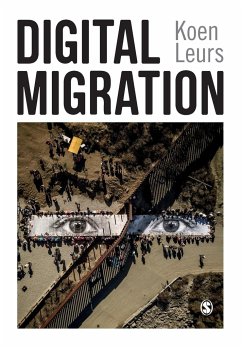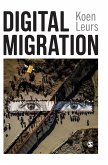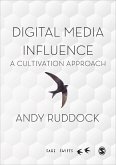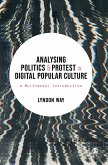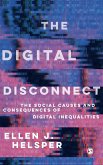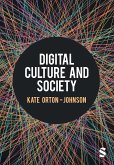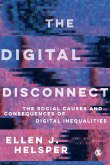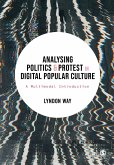A revelation for digital researchers and a provocation for migration scholars It introduces an insightful, inspiring, and inviting way of making sense of the messiness without losing hope of changing things.
- Nishant Shah, Chinese University of Hong Kong
A must read for everyone who is concerned with questions of human mobility, media and communications and the digital border.
- Myria Georgiou, LSE
A much-needed addition to scholarship on mobility, technology, and migration The book is poised to become a touchstone text.
- C.L. Quinan University of Melbourne
In contemporary discussions on migration, digital technology is often seen as a 'smart' disruptive tool. Bringing efficiencies to management, and safety to migrants. But the reality is always more complex.
This book is a comprehensive and impassioned account of the relationship between digital technology and migration. From 'top-down' governmental and corporate shaping of the migrant condition, to the 'bottom-up' of digital practices helping migrants connect, engage and resist.
Taking an interdisciplinary approach, Digital Migration explores: The power relations of digital infrastructures across migrant recruitment, transportation and communication. Migrant connections and the use of digital devices, platforms and networks. Dominant digital representations of migrants, and how they re resisted. The affect and emotion of digital migration, from digital intimacy to transnational family life. How histories of pre and early-digital migration help us situate and rethink contemporary research. The realities of researching digital migration, including interviews with leading international researchers. Critical yet hopeful, Koen Leurs opens up the unequal power relations at the heart of digital migration studies, challenging us to imagine more just alternatives.
Koen Leurs is an Associate Professor in Gender, Media and Migration Studies at the Graduate Gender Program, Department of Media and Culture, Utrecht University, the Netherlands.
All author royalties for this book will be donated to the Alarm Phone, a hotline for boatpeople in distress.
- Nishant Shah, Chinese University of Hong Kong
A must read for everyone who is concerned with questions of human mobility, media and communications and the digital border.
- Myria Georgiou, LSE
A much-needed addition to scholarship on mobility, technology, and migration The book is poised to become a touchstone text.
- C.L. Quinan University of Melbourne
In contemporary discussions on migration, digital technology is often seen as a 'smart' disruptive tool. Bringing efficiencies to management, and safety to migrants. But the reality is always more complex.
This book is a comprehensive and impassioned account of the relationship between digital technology and migration. From 'top-down' governmental and corporate shaping of the migrant condition, to the 'bottom-up' of digital practices helping migrants connect, engage and resist.
Taking an interdisciplinary approach, Digital Migration explores: The power relations of digital infrastructures across migrant recruitment, transportation and communication. Migrant connections and the use of digital devices, platforms and networks. Dominant digital representations of migrants, and how they re resisted. The affect and emotion of digital migration, from digital intimacy to transnational family life. How histories of pre and early-digital migration help us situate and rethink contemporary research. The realities of researching digital migration, including interviews with leading international researchers. Critical yet hopeful, Koen Leurs opens up the unequal power relations at the heart of digital migration studies, challenging us to imagine more just alternatives.
Koen Leurs is an Associate Professor in Gender, Media and Migration Studies at the Graduate Gender Program, Department of Media and Culture, Utrecht University, the Netherlands.
All author royalties for this book will be donated to the Alarm Phone, a hotline for boatpeople in distress.
Leurs offers an insightful account of the complex but important relationship between migration and digitisation, drawing out the key parameters of digital migration studies. The rich material and conversations informing the book challenge disciplinary silos and demonstrate why it matters to study migration and digitisation together. This is a relationship that we need to explore in its many dimensions if we are to understand how states, people but also technologies shape crossborder mobility, its imaginings, controls and practices. The book offers precisely that holistic perspective. A must read for everyone who is concerned with questions of human mobility, media and communications and the digital border. Myria Georgiou

